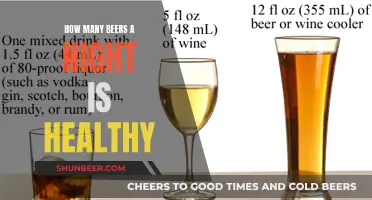
Spiked seltzer has become increasingly popular in recent years, with many consumers seeking a lighter alcoholic beverage. With its subtle flavours and low-calorie count, it may seem like a healthier option than beer. But is it really?
Well, it's complicated. Spiked seltzer does tend to have fewer calories and carbohydrates than beer, and it's also gluten-free. However, that doesn't necessarily make it healthier. The very characteristics that make it low-calorie can also make it easier to drink more of it, leading to excessive alcohol consumption, which has its own health risks.
So, while spiked seltzer may be a refreshing alternative to beer, it's important to remember that alcohol is alcohol, regardless of the source, and should always be consumed in moderation.
| Characteristics | Values |
|---|---|
| Calories | Spiked seltzer: 100 per 12-ounce can; Beer: 150 per 12-ounce can |
| Carbohydrates | Spiked seltzer: 2 grams per 12-ounce can; Beer: 15-30 grams per 12-ounce can |
| Alcohol by Volume (ABV) | Spiked seltzer: 5%; Beer: 5% (regular), 4.2% (light), 6.5% (craft) |
| Gluten | Spiked seltzer: Gluten-free; Beer: Contains gluten |
| Sugar | Spiked seltzer: 2 grams; Beer: N/A |
| Taste | Spiked seltzer: Light, refreshing; Beer: Heavy |
| Drinkability | Spiked seltzer: Easy to drink, not filling; Beer: Can be heavy or filling |
What You'll Learn
- Spiked seltzer is often lower in calories and carbohydrates than beer
- Spiked seltzer is gluten-free, while beer is not
- Beer may fill you up faster, making you less likely to overconsume
- Spiked seltzer is made from fermented cane sugar, while beer is made from fermented grains
- Spiked seltzer is more hydrating than beer

Spiked seltzer is often lower in calories and carbohydrates than beer
Craft beer can contain even more calories, with some brands totalling 200 calories per 12-ounce serving. These beers may also have a higher ABV, sometimes reaching 6.5%. Therefore, hard seltzer is a good option for those looking for a low-calorie, low-carb alcoholic beverage.
The low-calorie nature of hard seltzer is one of the main reasons for its surge in popularity. Many brands market their products as a healthy alternative to beer, and sales have increased by over 200% in the past year. However, it's important to remember that "low calorie" does not always mean "healthy". Alcohol is alcohol, regardless of the source, and excessive drinking is linked to various long-term health issues, including high blood sugar, heart disease, stroke, digestive problems, and liver disease.
In addition, the refreshing and light nature of hard seltzer can make it easy to drink several servings without feeling full or experiencing the strong taste of alcohol. This may lead to overconsumption, negating the benefits of the lower calorie and carbohydrate content. Therefore, while hard seltzer may be a better option in terms of calories and carbs, it is important to consume it in moderation, just like any other alcoholic beverage.
Bloody Mary vs Beer: Which Booze is Healthier?
You may want to see also

Spiked seltzer is gluten-free, while beer is not
Many popular brands of spiked seltzer are gluten-free, including White Claw, Truly Hard Seltzer, Crook & Marker, and Bon & Viv Spiked Seltzer. These brands offer a range of flavours, such as black cherry, ruby red grapefruit, and raspberry lime.
The gluten-free nature of spiked seltzer contributes to its reputation as a "healthy" alternative to beer. Spiked seltzers are often marketed as low-calorie and low-carb, with around 100 calories and 2 grams of carbohydrates per 12-ounce can, compared to 150 calories and 15 to 30 grams of carbohydrates in a similar-sized beer.
However, it's important to remember that "low calorie" does not always equate to "healthy". Spiked seltzers still contain alcohol, which has its own set of health consequences when consumed in excess. Additionally, the light and refreshing nature of spiked seltzer can make it easier to overconsume, leading to potential health risks such as high blood sugar, heart disease, stroke, digestive problems, and liver disease.
While spiked seltzer is gluten-free and may have some nutritional advantages over beer, it's important to consume it in moderation and be mindful of the potential health risks associated with excessive alcohol consumption.
Homebrew Beer: Healthier Choice or Marketing Myth?
You may want to see also

Beer may fill you up faster, making you less likely to overconsume
Beer is a carbonated beverage, and the bubbles can make you feel full and bloated. This is why some people switch to hard liquor or wine to get drunk, as the carbonation in beer can cause you to run out of stomach room. However, beer is less carbonated than soda, and it is much easier to knock back a six-pack of beer than it is to drink six sodas.
Beer is also an "empty calorie" drink, providing almost no nutrients while still giving you calories. This means that you can drink a lot of calories very quickly, and still have room in your stomach for a full meal. This is why drinking beer can make losing weight very difficult.
Spiked seltzers, on the other hand, are lower in calories and carbs and are not as filling as beer. This means that someone who might drink just one or two beers could end up drinking multiple cans of hard seltzer.
However, it's important to remember that alcohol is alcohol, regardless of the source. Excessive drinking is linked to many long-term health effects, including high blood sugar, heart disease, stroke, digestive problems, liver disease, and cancer. Therefore, it's crucial to consume all types of alcohol in moderation.
In conclusion, while beer may fill you up faster than spiked seltzer, it's still important to be mindful of your consumption. The "health halo" effect of spiked seltzer can trick people into thinking they are making a healthier choice, but alcohol content and health consequences should always be considered.
Sour Beers: Health Benefits or Just a Tangy Treat?
You may want to see also

Spiked seltzer is made from fermented cane sugar, while beer is made from fermented grains
Spiked seltzer is a type of alcoholic drink that has become increasingly popular in recent years. It is made by adding alcohol to carbonated water, often with fruit flavourings. The alcohol in spiked seltzer is usually produced by fermenting cane sugar, although malted barley is also sometimes used.
Beer, on the other hand, is typically made through the brewing and fermentation of cereal grains, most commonly barley. The fermentation process involves converting the starch sugars in the grains into ethanol and carbon dioxide, which gives beer its carbonation.
So, while spiked seltzer is made from fermented cane sugar, beer is made from fermented grains. This difference in production methods has several implications for the characteristics of the final products. For example, the use of fermented sugars in spiked seltzer, rather than fermented grains, makes it gluten-free, while many beers contain gluten.
In addition, spiked seltzer typically has a lower calorie and carbohydrate content than beer. A 12-ounce can of spiked seltzer usually contains around 100 calories and 2 grams of carbohydrates, compared to 150 calories and 15-30 grams of carbohydrates in a similar-sized beer.
However, it is important to note that the health benefits of spiked seltzer over beer are not clear-cut. While it may have fewer calories and carbohydrates, spiked seltzer still contains alcohol, which is linked to various long-term health effects when consumed in excess. Additionally, the light and refreshing taste of spiked seltzer may make it easier to drink more than intended, potentially offsetting any benefits of its lower calorie content.
Beer Drinkers: Healthy or Harmful?
You may want to see also

Spiked seltzer is more hydrating than beer
Spiked seltzer is often marketed as a healthier alternative to beer, and while it does have some benefits, it's important to understand the whole story. One of the main advantages of spiked seltzer is that it tends to have fewer calories and carbohydrates than beer. A typical 12-ounce can of spiked seltzer contains about 100 calories and 2 grams of carbohydrates, compared to 150 calories and 15 to 30 grams of carbohydrates in a similar-sized beer. This makes it a good option for those watching their caloric intake or following a keto or low-carb diet.
However, it's important to remember that low calorie does not always mean healthier. Spiked seltzer, despite being more hydrating than beer, can be easier to drink, leading to overconsumption. Additionally, the light and refreshing nature of spiked seltzer means it doesn't make you feel full like beer, so it's easy to have several without realizing your alcohol intake.
Another benefit of spiked seltzer is that it is typically gluten-free, as it is made with fermented cane sugar instead of fermented grains. This makes it a good choice for those with gluten sensitivities or celiac disease. However, it's important to check the labels, as not all brands are 100% gluten-free.
The refreshing fruit flavors of spiked seltzer can also be misleading, as it may feel like you're drinking flavored fizzy water. This can lead to a higher consumption than intended, especially when compared to the heavier feeling of drinking beer.
While spiked seltzer may have some advantages over beer in terms of calories, carbohydrates, and gluten, it's important to remember that alcohol is alcohol, regardless of the source. Excessive drinking of any alcoholic beverage can lead to long-term health effects, including high blood sugar, heart disease, stroke, digestive problems, liver disease, and cancer. Therefore, it's crucial to consume all alcoholic drinks, including spiked seltzer, in moderation.
Is Pacifico Beer a Healthy Choice?
You may want to see also
Frequently asked questions
Spiked seltzer is generally lower in calories and carbohydrates than beer, but it is still an alcoholic drink, so it's not necessarily healthier.
Spiked seltzers are usually gluten-free, which is a benefit for those with gluten intolerance or coeliac disease. They also tend to be lower in calories and carbohydrates, with a less-filling effect that may reduce overconsumption.
Spiked seltzer is easy to drink, which may lead to overconsumption. It also lacks the nutritional value of beer and can be more highly processed.
Spiked seltzer is often lower in calories than cocktails and mixed drinks, and it is also gluten-free, unlike beer and spirits. However, it is not as hydrating as non-alcoholic seltzer and can be more processed.
The "health halo" effect refers to the perception that spiked seltzer is a healthy alternative to beer or other alcoholic drinks due to its lower calorie and carbohydrate content. This perception may lead to excessive consumption, as people may assume it is a healthier option.







